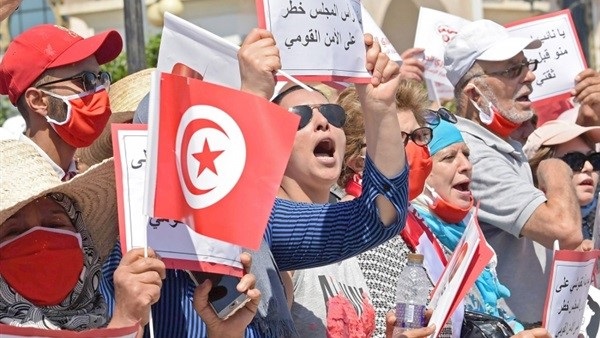Blackmail and covering up corruption: Latest accusations against Ennahda in Tunisia

Before the end of August, Tunisian President Kais Saied
called for extending the freeze on looted funds, which are supposed to be
unfrozen by the end of last month.
During a meeting with Tunisian Minister of State for Property
and Real Estate Affairs Mohamed Al-Raqiq and the general in charge of state
disputes, Ali Abbas, Saied said, “Any delay could benefit those who have
plundered the Tunisian people’s money over decades.”
Saied pointed out that this money was enough to keep Tunisia
out of the current economic crisis, explaining, “They have the people’s money
and they want to lend us on their terms,” meaning Tunisia’s negotiations with
the International Monetary Fund.
The presidency’s statement explained that the meeting
between Saied and the officials touched on the procedures and conditions of the
countries and banks in which the “stolen” funds are located, adding that some
of them “want a judgment in person against the accused while they know with
certainty that these people are fugitives abroad.”
Diplomacy and judiciary
In the same context, Saied stressed the necessity of
paralleling diplomatic work with judicial work, and that “these issues must be
raised within the framework of international and regional organizations to
unify the positions of countries affected by the seizure of their people’s
wealth.”
Stalled efforts
Unlike the efforts of President Saied, whose presidential
term expires in October 2024, the story of frozen funds dates back to the
period after the revolution, and despite all the efforts that were said at the
time to recover the funds, all efforts did not result in their return.
Added to the list of accusations against Ennahda is obstructing
the return of the stolen funds, as Tunisian analysts and newspapers monitored
Ennahda’s role in not returning the funds due to the fact that it was the party
with the most control in the aftermath of the revolution.
Economist Hussein al-Ruhaili said in media statements that
the report of the fact-finding committee on the looted funds was buried by
Ennahda to cover up for 400 businessmen involved in plundering public money.
Blackmail practiced by Brotherhood
While Ruhaili referred to the blackmail practiced by the
movement on the plunderers to support it in exchange for silence on their
files, Tunisian activist Sarah Brahmi told the Reference that Ennahda’s goal is
power, for which it will do anything.
In the wake of the revolution, Ennahda tried to consolidate
its rule by once again attracting political parties or seeking the support of
businessmen.
President Saied had previously called on those involved in
acts of corruption and plunder to make a penal reconciliation, while pledging
to establish development projects in poor areas.
It is noteworthy that Saied’s previous presidential program
included holding the corrupt and those involved in plundering public money
accountable, while demanding that they return stolen funds.









